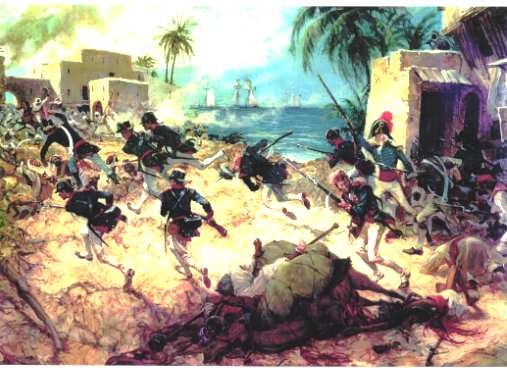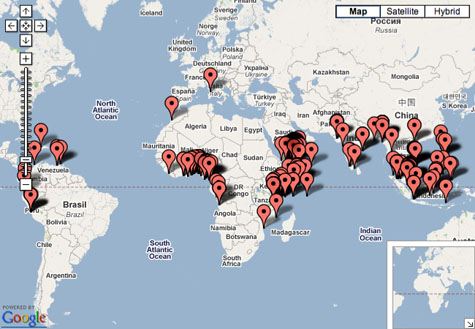A great little article about how we used to do things, when it came to pirates. Send the Marines and some Mercenaries, and attack the land bases of these pirates. That and stop paying these ransoms, because it only encourages these guys.
Now do I see an Obama administration sending troops to the shores of Somalia, just like we did in 1804? Or will the memory of our efforts in Somalia in the early nineties kick in, and prevent us from doing what we need to do?
I don’t see us doing anything on land because of the bitter memory of our last venture there, but you never know. If piracy becomes a money making tactic of the mufsid dorks, then we might see more of an effort to combat it as part of the overall war strategy. More than likely, it will continue to be treated as a criminal thing, and ships will be on their own and the various navies involved will only have a partial impact on protecting them all.
Although, if we are to learn anything from history, we must deal with the land component of piracy as part of an overall strategy, if we are truly serious about combating it. –Head Jundi
——————————————————————

To the Shores of Tripoli . . .
The place to stop pirates is on the beaches.
by Seth Cropsey
12/08/2008, Volume 014, Issue 12
The November 15 hijacking 450 miles east of Mombasa, Kenya, of a thousand-plus foot oil tanker carrying more than two million barrels of crude oil forced international recognition that the seas have been dramatically added to the world’s list of outlaw space. According to the International Maritime Bureau, recorded attacks by pirates in the Gulf of Aden area have more than tripled–to 92–in the past year. The million square mile swath of the Indian Ocean off, and south of, the Somali coast through which approximately 20,000 ships a year pass between Asia, Europe, and the Western Hemisphere is within hailing distance of smaller, but no less significant, portions of the Middle East and South/Central Asia whose lawlessness has produced important consequences around the world. The prospect of a large-scale meeting of lawless land and lawless sea would be especially troubling even if the possible failed state in the middle–Pakistan–didn’t possess nuclear weaponry.
But for now, the problem is that Somali pirates who use global positioning devices to help identify potential targets, who deploy “mother” ships that can venture out to sea to launch and recover small fast boats, and who have mastered simple but effective tactics for capturing ships have transformed one of the world’s strategic choke points into a watery version of the Cyclops’ island home, a place without law. The consequences transcend what is already happening: spiking maritime insurance rates, significantly increased costs to international consumers as shipping lines reroute around the Cape of Good Hope, and a growing problem of captured ships’ crews held hostage in Somali pirate havens–330 crew members from 25 nations at last count.
(more…)


